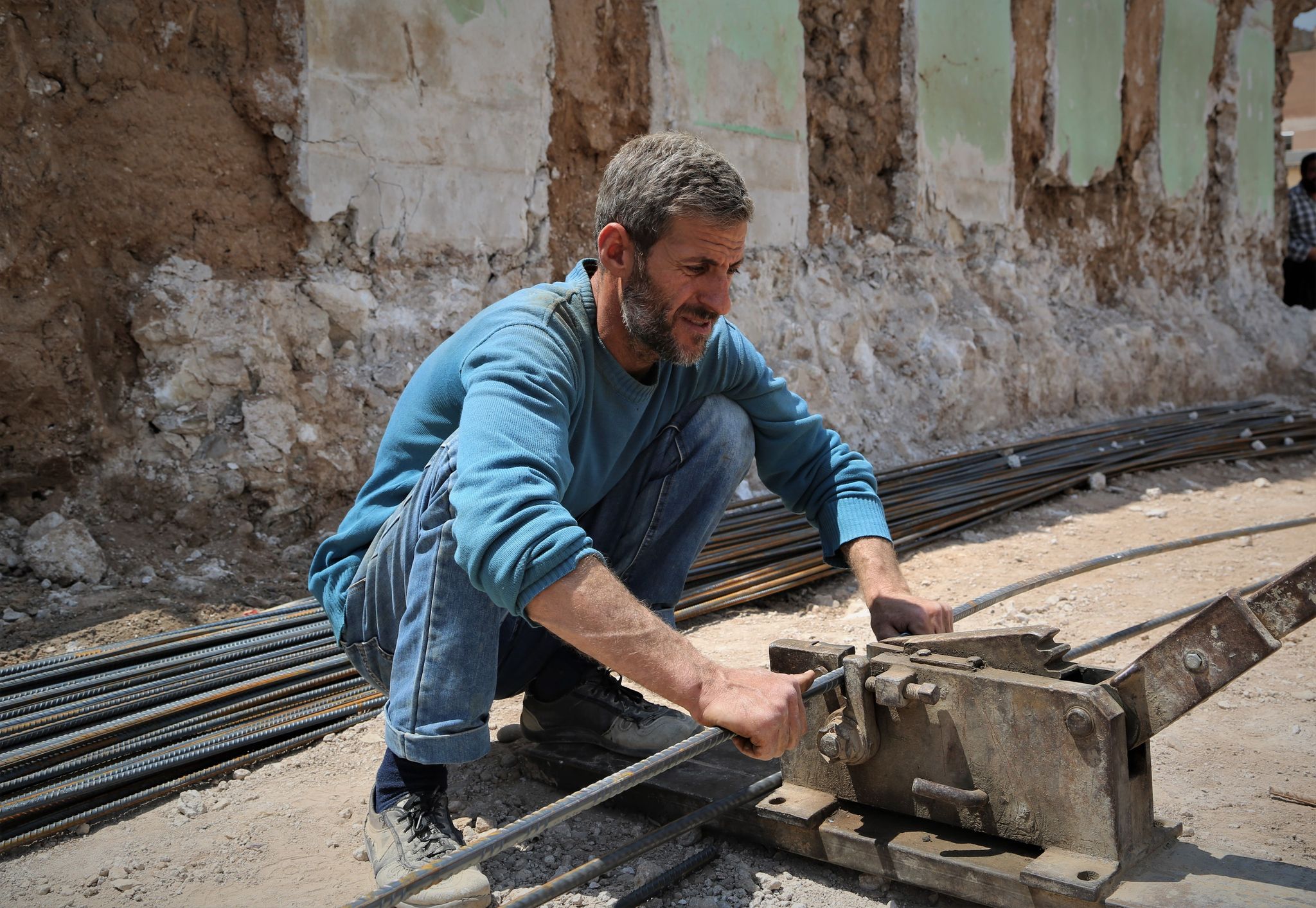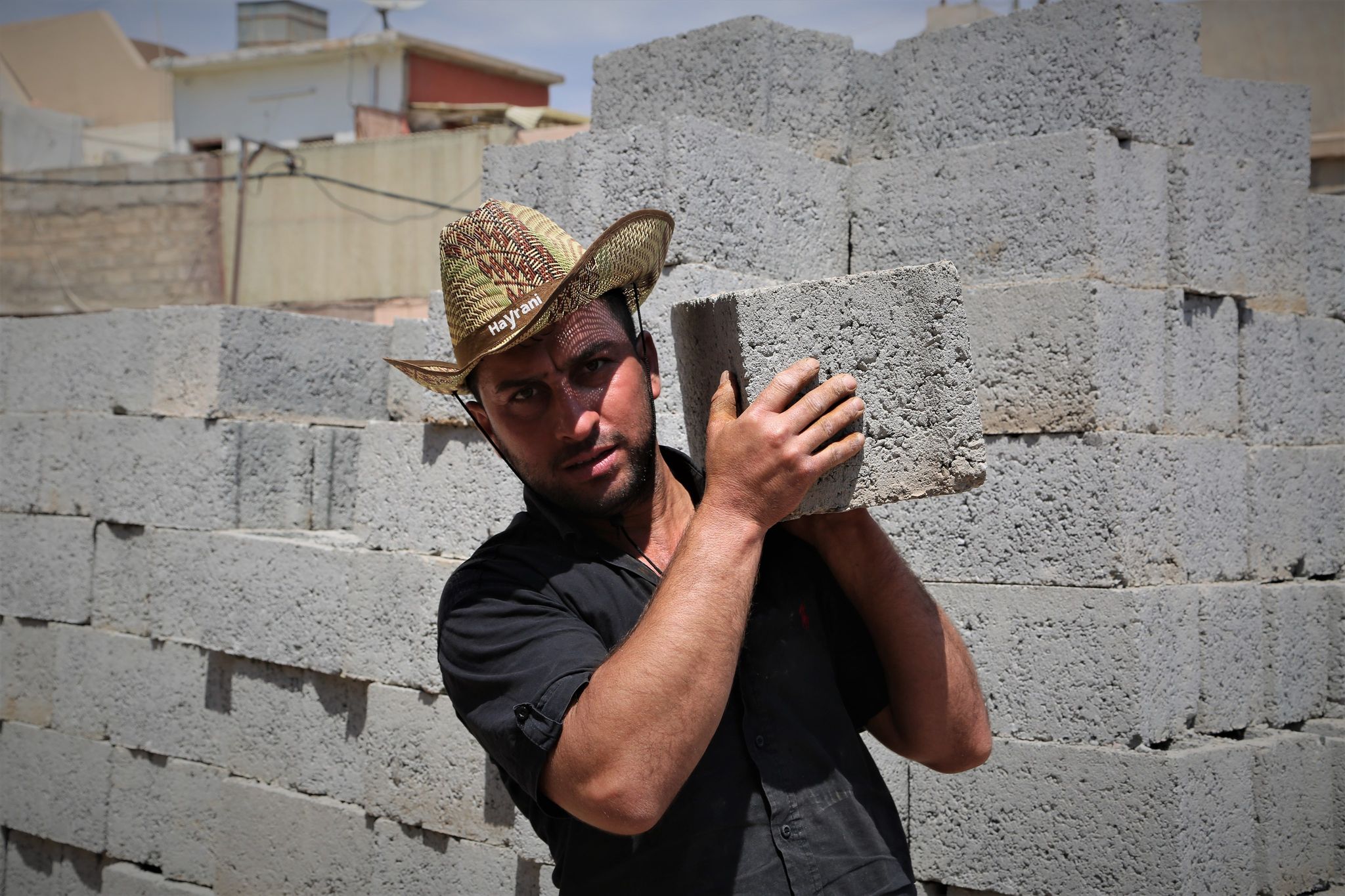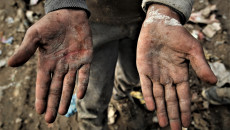Ahmed Al-Shati was hopefully waiting at the square for daily-paid masons to get a work at the beginning of the week following a three-day weekend lockdown. Three unpaid days is a big challenge for Ahmed who makes his living from daily work as builder.
“The curfew was imposed by decision makers and crisis cell whom did not wonder if this decision is suitable for daily-paid workers,” Ahmed told KirkukNow while he was sitting in builders square close to bridge of al-Askari neighborhood, looking for someone to hire him for 10-25 thousand Iraqi Dinars IQD ($7-17).
Ahmed pays IQD175,000 monthly as house rent and makes living for 6-members family.
“Business owners do not follow corona virus precautions and once you are infected, you are not compensated or paid for his absence days.”
“Business owners do not follow corona virus precautions and once you are infected, you are compensated or paid for his absence days.”
The continuous threat of Covid-19 pandemic escalated in February, pushed Iraqi authorities to impose a three-day curfew all over Iraq, excluding the Kurdish region, putting life of daily-paid workers in danger and limiting their income almost into half.
Demonstrations by store owners, street vendors protesting a three-day weekend lockdown, Fridays, Saturdays and Sundays, whom protested the procedure for reducing their income to half, pushed the Iraqi authorities to limit the curfew to Fridays and Saturdays in mid-March and preserving the night curfew valid from 9 pm to 5 am.

Kirkuk 2020: Builders make IQD15-25 thousand a day. KirkukNow.
Labor unions blame the authorities for taking decisions that affects life of a big part of the society without offering any compensations.
Jasim Mohammed Fahad, chief of labor union in Kirkuk, told KirkukNow that the curfew put a “negative impact on many laborers, in particular those in the sectors of construction, transport and restaurants whom were banned to go to work.”
The social insurance that Iraqi authorities provide does not cover daily-paid workers.
“Free works like daily-paid jobs and public transport drivers have no right for social insurance,” said Abbas Fadhil, manager at Labor and technical rehab in Kirkuk, under Iraqi ministry of labor and social affairs.
“If they live under poverty line, then the state embraces them under social care programs not social insurance.”
“If they live under poverty line, then the state embraces them under social care programs not social insurance.”
If they are daily-paid as a permanent job in project even working for half an hour a day, “they are entitled to social insurance and the business owner is obliged to pay his monthly salary for that period,” he added.
Regarding force majeure conditions, employers have to pay one year insurance to the government and has no right to release employees unless approved by minister of labor. “In case of violation of registration of employees at social care directorate, he is charged by court,” Fadhil added.
Iraq has witnessed a sharp increase in national poverty rate up to 31.7% from 20% in 2018 and the total number of poor to 11.4 million as a socio-economic impact of the Covid-19 pandemic, a newly released assessment by the Iraqi Ministry of Planning with the support of UNICEF, World Bank, and Oxford Poverty and Human Development Initiative, found.
Iraqi government has spent only USD20 per person as one and only payment for non-employed people with limited income amid Covid-19 pandemic when unemployment hit 30% early 2020, local officials in Kirkuk earlier told KirkukNow.
Ministry of labor and social insurance said that almost 0.5 million people receive social insurance salaries from private sectors of construction, foreign companies, communication, restaurants, bakeries, stores and others.
State employees one retired are entitled to a pension salary mounting to almost 80% of their monthly salaries while at office.
The daily-paid builders are not entitled to social insurance or retirement, blaming the government and unions for not enlightening them about their lawful rights.
“Women laborers carry a heavier burden for being housekeepers, mothers and breadwinners,” said Haifa Salahddin, member of women league in Kirkuk. “They can’t even afford treatment when they are infected of Covid-19.”
“They can’t even afford treatment when they are infected of Covid-19.”
The oil rich city of Kirkuk, Iraq's second largest oil reserves, is ethnically a mixed province of Kurds, Sunni and Shiite Arabs, and Turkmen. It has long been at the center of disputes between Baghdad and the autonomous Kurdistan Regional Government KRG.
Kirkuk, 238 kilometers north of Baghdad, is located in a disputed area of Iraq that runs from Shingal on the Syrian border southeast to Khanaqin and Mandali on the Iranian border. Kurds wanted Kirkuk to become part of the Kurdistan region, which has been opposed by the regions with Arab and Turkmen populations.
In February 2021, Kirkuk has produced about 3.8 million barrels for $60/barrel topping up $228 million to Iraq’s national revenues while in January it has produced only 3m barrels of crude oil, barrel per $53.






